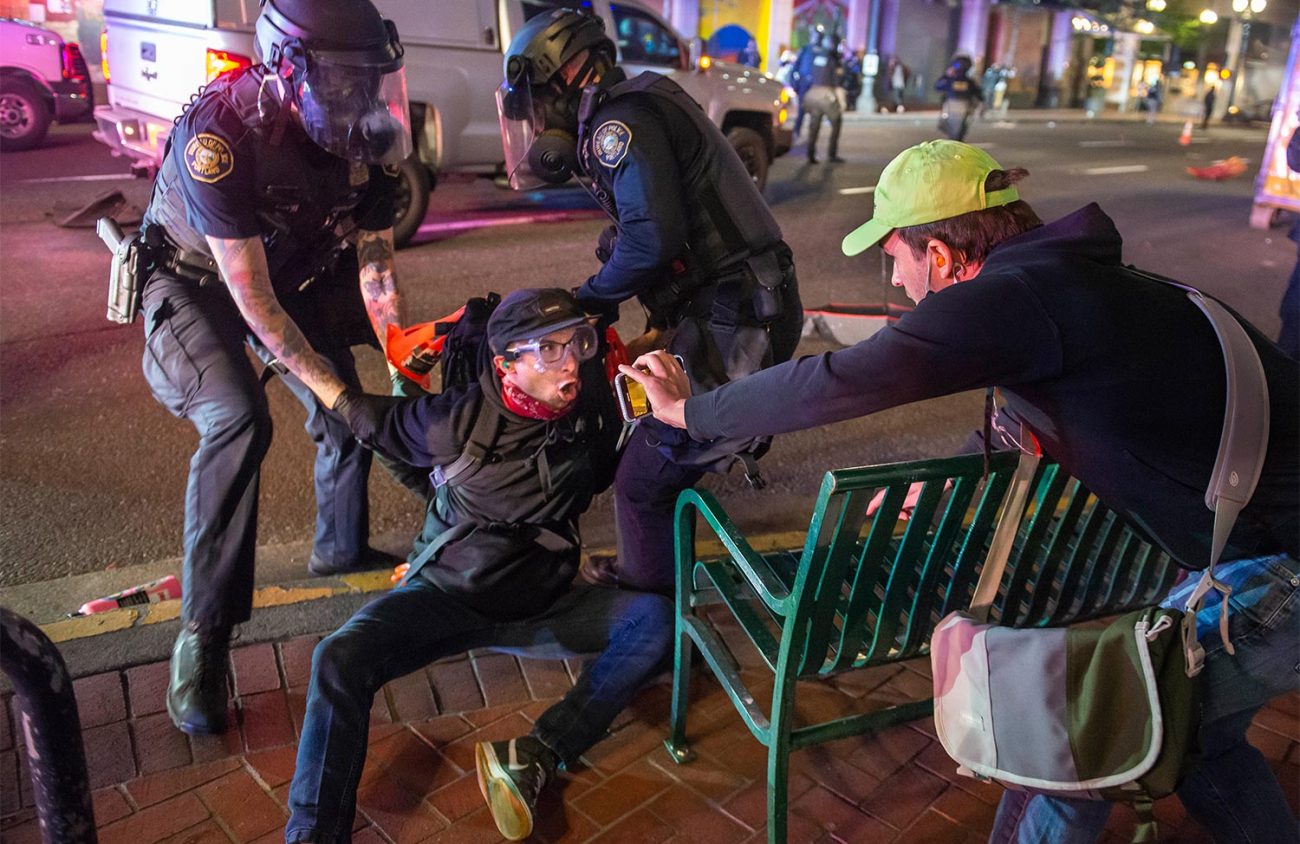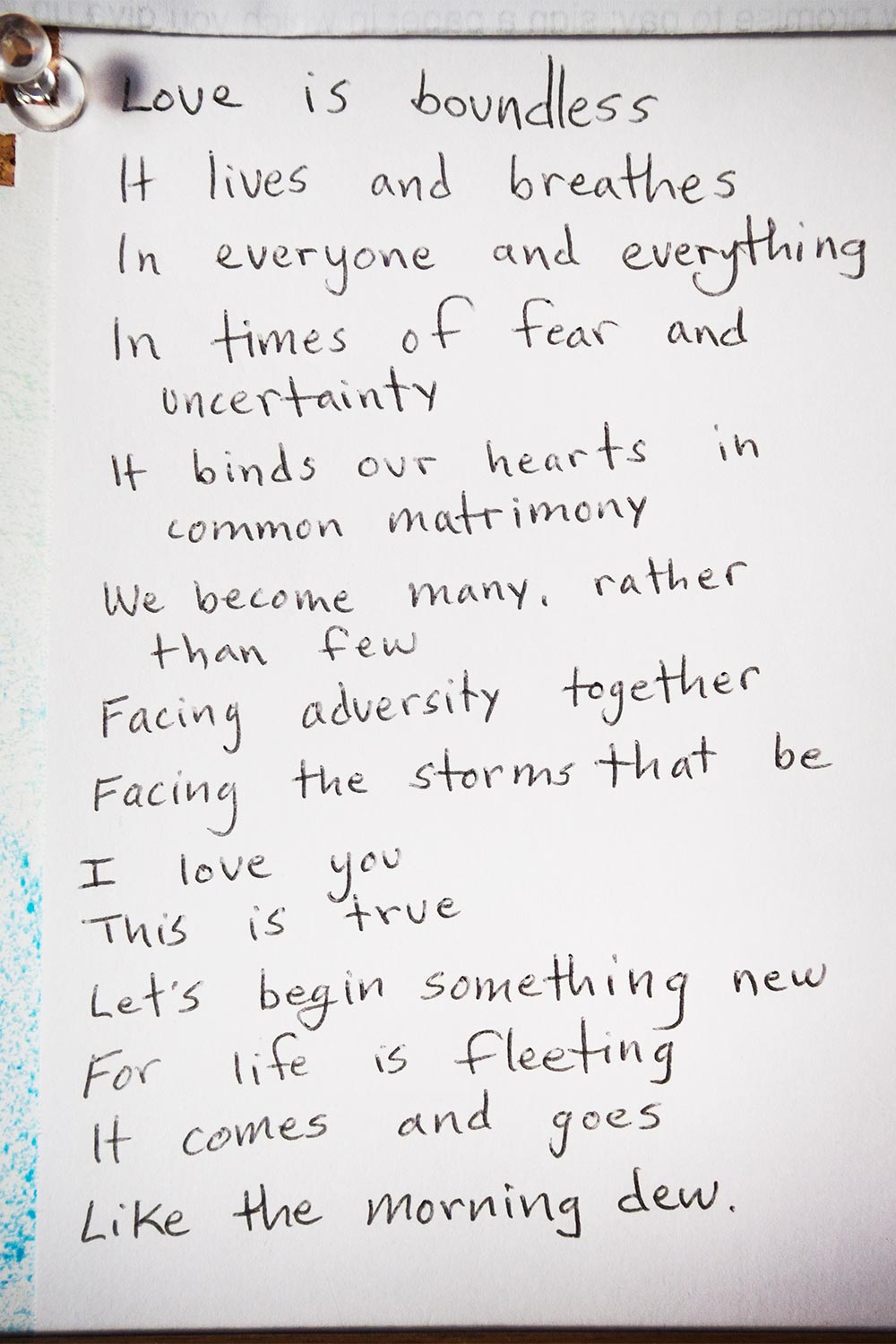It was shortly after midnight on July 5, 2020, when I came to a realization that would change the course of my life.
Earlier that night, I stood, camera in hand, across from the justice center in downtown Portland, a hotspot of Black Lives Matter protests in the wake of the police killing of George Floyd. My role was clear — I was there as a photojournalist to document the events.
The police bull-rushed the crowd and made the first round of arrests. I watched five police shove a small-framed young woman to the ground. Narrowly escaping arrest, she ran away, bloodied and in tears. My phone was blowing up with calls and texts from my team. Frantically, I got on the line, “I can’t find Luke!”
“Jess,” my colleague replied with a voice much calmer than mine. “Luke was just arrested.”
“No!” I yelled, as if I could change what already happened. I felt like I’d been hit by a brick. For the first time last summer, the tears came.
That was the moment I realized I had fallen in love with Luke.
Falling in love wasn’t on my radar for 2020, but then again, none of the other events that had happened that year were, either, a sentiment that I’m sure is shared by many. Before COVID hit, it had been a few years since I worked as a photojournalist. Life had kept me busy with a job I often joked paid the bills.
But on May 29, word of a demonstration eight blocks from my home sparked a passion for photojournalism that had previously been suppressed by the demands and disorder of life. I grabbed my camera and biked to the scene of the first BLM protest in Eugene. That night paved the way for the love stories to come, one of self-love, community and partnership.
Isolated due to the pandemic, I immediately found camaraderie at the protests. Documenting the protests provided me with a renewed sense of purpose. I felt appreciated and began making new friends at a time when opportunities for forming friendships were limited.
One of those friends was Luke Schwedler.
I had met him a few weeks prior to the fateful night in Portland. My mind solely focused on journalism, I had gone to an event in search of contacts for a story. I had just exchanged phone numbers with live streamer Tre Stewart of Boop Troop Eugene when Luke asked me for my number as well. At that point, I didn’t even know his name, but his guileless smile told me I could trust him.
What ensued was a friendship so natural, you would have thought we’d known each other for years. We hung out chatting long after the protests we were attending concluded, with one featuring a spontaneous 2 am wrestling match on my front lawn. At a Juneteenth celebration, Luke turned down a ride home from his parents and walked the two miles with me back to my house.
Luke was one of 10 of us who had traveled to Portland for the protest on the 4th. His experience in Portland dramatically changed his perspective on society.
Witnessing the police brutality and experiencing an arrest with use of excessive force, which nearly broke his thumb, wore on Luke. It was clear in his behavior that he was suffering, frustrated and angry most of the time.
He did his best to maintain his cheerful demeanor; still, crippling depression and numerous triggers throughout the protests tore at him. His usual coping mechanism of avoidance and isolation weren’t conducive to a healthy relationship. The beginning of our courtship was marked by highs and lows, with tear gas, rubber bullets, flash bangs and Molotov cocktails scattered in between.
Adding to that, each of us had our own internal conflict. His lack of relationship experience, sexual trauma and porn addiction created an internal struggle to which I couldn’t relate. My own conflict revolved around the ethics of dating a protester while trying to remain a journalist in the situation, as well as the fact that I had just recently gotten out of a long-term relationship. “Was I just rebounding?” I asked myself. “Are we trauma bonding?”
There was some of that. The adrenaline of covering a protest can be addictive, but can also exhaust you. And with the protests happening into the early morning hours, a normal life is impossible. As fall arrived, we took a step back from protests and sought out new plans for the future.
Come November, I moved in with Luke. I was anxious and nervous. I knew living together would either make or break the relationship and it was still fairly early in our courtship.
Ultimately, it made things better. I found myself waking up with a smile every morning, in a home where I could finally relax. Moving in together gave us time to connect outside of the drama of protests. Here in the mundane of the day to day, I could imagine settling into a life of comfort with him.
But 2021 has other plans for us.
This Valentine’s weekend, I depart for Costa Rica, where I will be documenting my experience living off-grid in a treehouse community, learning about rainforest conservation and eco-tourism.
Meanwhile, Luke heads to Israel for an internship. Though our destinations are far apart, we both have similar goals of self-growth and discovery. A year ago, I wouldn’t have envisioned this was possible. 2020 spurred a self-realization and connection with myself that pushed me beyond the complacency and stagnancy of my life previously. The love I found at the protests, both in myself and my community, set the foundation for my partnership with Luke, one of support and encouragement. We have inspired each other to set our goals higher and pursue this next leg of our journey.
With a fair bit of irony, we might not be physically together for the holiday celebrating love, but our hearts will be. Together, despite the distance, we are beginning something new. And when we reunite our bond will be even stronger.
Find more of Jessica Frink’s work at JessicaFrink.com.

